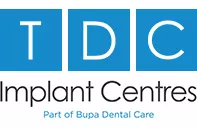We aim to provide you with information that helps you make the best treatment decisions. In this section, we provide useful articles to answer the questions we are often asked, and tell you more about the award-winning TDC team.
Can I get implants with gum disease?

“You can have dental implants if you have gum disease” says TDC Implant Centres Lead Surgeon, Dr Michael Zybutz.
“Unfortunately, many of our patients have been incorrectly told gum disease or bone loss makes them unsuitable for dental implant surgery.
So they suffer unnecessarily with missing and loose teeth, or uncomfortable dentures.
They live with constant dental pain, unable to eat certain foods for fear of further loosening or tooth loss and, sadly, too self-conscious to smile.
They come to us as a last hope, asking: ”I have gum disease, can I have implants?”
When Anthony (Dr Anthony Zybutz, Lead Dentist) and I tell them we can safely restore full sets of fixed teeth on implants, restoring their smiles and self-confidence in a matter of hours, it’s a huge relief for them.”
What is gum disease?
Gum disease develops when the soft gum tissue and bone surrounding your teeth become infected. Gingivitis is the early form of gum disease, occurring when there’s a build-up of plaque (deposits of bacteria) on the teeth.
If untreated, the plaque can spread beneath the gum line and develop into a more advanced gum disease called periodontitis or periodontal disease.
What causes gum disease?
The leading cause of gum disease is plaque build-up, usually caused by an inadequate oral hygiene routine.
Smoking is another known cause, and hereditary illnesses can be a factor.
It’s estimated that 90% of the UK population have some level of gum disease*, with many unaware they have it in the early stages.
According to the American Academy of Periodontology (AAP); “Gum disease is often silent, meaning symptoms may not appear until the advanced stages.”
Can you prevent gum disease?
“People don’t realise the consequences of poor oral hygiene and not caring properly for their teeth” says Dr Michael.
“Just two minutes of brushing teeth twice a day using a fluoride toothpaste keeps your mouth healthy, reducing your chances of developing gum disease. It can save years of pain, worry and a lot of expense.
Flossing as part of your daily oral hygiene routine is highly recommended to ensure all parts of the teeth are properly cleaned.
Dental floss and interdental brushes can reach the small spaces between your teeth and around the gum line.”
How is gum disease treated?
How you treat gum disease varies by patient.
It’s important to have regular check-ups with a dental professional as they can catch any issues and advise on the best gum disease treatments for you.
Gingivitis is usually reversible with a good at-home oral hygiene routine (diabetes and pregnancy can affect how well the body can reverse the effects of gum disease); your dentist or hygienist can offer advice regarding flossing and brushing.
People more severely affected with periodontal disease, may require antibiotics or surgical solutions such as dental implants.
However bad you think the condition of your gums may be, don’t put off seeking help. Your dentist can advise the best treatment options.
Why is gum disease serious?
In the early stages of gum disease (gingivitis), key symptoms are bleeding gums when brushed, and the gum tissue becoming swollen and sore.
Additional symptoms include bad breath and an unpleasant taste in the mouth.
Left untreated, gum disease can advance to periodontitis (periodontal disease) which is more serious as the gums shrink and jawbone density can become reduced.
Eventually the receding gums and bone can no longer support your teeth, so they become loose and can even result in tooth loss.
And there are wider implications for your health: “Periodontal disease can be linked to stroke, heart disease, diabetes and other chronic illnesses,” say the AAP.
Can you get dental implants if you have gum disease?
At TDC we use an advanced, highly skilled technique called Smile in a Day, where dental implants and a first full set of fixed teeth are placed on the same day.
The treatment is suitable even for people with severe gum disease.
When performed by a suitably experienced dental surgeon, the procedure solves all the problems associated with gum disease, loose and missing teeth.
As well as new teeth that look and function like natural teeth, gum infection is eliminated, and oral health restored.
Can I have dental implants if I have bone loss?
Yes, TDC Smile in a Day is suitable for replacing lost teeth for patients with extreme bone loss.
The implants, (usually four per jaw – the technique is sometimes referred to as “All on Four”), are placed at very precise angles, making use of the maximum amount of available jawbone, even if there’s loss of bone density. In most cases bone graft surgery is not needed.
Occasionally patients have specific medical or dental needs that require additional treatment such as zygomatic (cheekbone) implants.
Even with zygomatic implants, the procedure can be carried out on the same day.
How is Smile in a Day different from traditional implant treatments?
With traditional dental implants, treatment involves more stages, often requiring additional surgical procedures such as tooth extractions and bone grafts, and many more months of healing time.
Smile in a Day is an advanced, less invasive implant placement technique, condensing multiple steps into much-reduced overall treatment time.
We extract any necessary teeth, place the dental implants (they replace your natural tooth roots) and fixed new teeth on the same day.
Patients arrive with loose and missing teeth and leave with full sets of teeth securely fixed on dental implants, beautiful new smiles and renewed confidence.
Your new teeth remain in place for about three months, night and day, to allow the bone to integrate with the implants and for your gums to settle. There is no need to wear a removable denture during this healing period.
The first set of teeth is then exchanged for the final, long-lasting set, crafted to give you the perfect fit.
Can any dentist perform Smile in a Day?
Whilst any qualified dentist registered with the General Dental Council can legally place dental implants, it is important to find a dentist with the skill and experience to safely deliver the clinical and aesthetic results you hope for.
All surgical procedures carry some risk, so it’s especially important when considering advanced, more complex, dental treatments such as same-day dental implants.
TDC Implant Centres have focused on dental implant treatment, specifically Smile in a Day same-day dental implants, since 2010.
The majority of our patients require at least one full jaw of teeth restored on implants (often both).
Under the clinical care of Drs Michael and Anthony and their teams, we routinely help the most complex cases.
Specialist periodontal care
The AAP describe a periodontist as “a dentist who specializes in the prevention, diagnosis, and treatment of periodontal disease … and in the placement of dental implants.”
Dr Michael is a UK-registered specialist periodontist with over 25 years’ experience.
To qualify as a specialist, dentists must be registered with the General Dental Council (GDC) and demonstrate proven additional training, qualifications and experience in their specialist field.
As Dr Michael specialises in the area of dentistry concerning the gums, jawbone and dental implant placement, our patients are often referred to us by general dentists, as well as patients who refer themselves.
Gum disease and bone loss are not barriers to dental implant treatment
“So many people come to us believing their gum disease and jawbone loss means they’re destined for a lifetime of dental pain, uncomfortable dentures and avoiding certain foods – and struggling with self-confidence as they’re embarrassed to show their smile,” says Dr Anthony.
“We founded TDC Implant Centres specifically to help these people.
We know Smile in a Day implants offer a life-changing solution.
Whatever the reasons for your problems, we’ll help find the right tooth replacement options for you.
Just take the first step – come and see us. We will never make you feel judged.”
Risks factors for dental implants
Dental implants are a proven and long-lasting fixed solution to loose and missing teeth, and dentures, and at TDC we are very proud of our consistently outstanding results and success rates.
It should be noted that all implant treatment carries a risk of failure and gum disease can be a risk factor. The key risk factors are as follows:
· Gum disease (especially untreated): Please note that gum disease is completely treated when all teeth are extracted before the implants are placed.
At TDC, we highly recommend attending regular hygiene appointments after treatment is completed so any issues can be identified before any potential issues become serious.
· Poor oral hygiene: Well cared for dental implants can last a lifetime, just like natural teeth.
Once the dental implant treatment is complete, it is the responsibility of the patient to look after their new teeth on implants – a good and regular at-home dental hygiene routine is vital.
At TDC we provide you with all the information you need to ensure you can keep your new teeth in the best possible condition.
· Smoking: smoking is not a barrier to having dental implants, but studies have shown that overall success rates are lower than with non-smokers.
However, nicotine constricts your blood vessels, depriving the tissue in your mouth of oxygen and nutrients, and also reduces saliva flow, all of which slow down the healing process.
Smoking also lowers your immunity and ability to fight infection.
· Diabetes (uncontrolled): Uncontrolled diabetes can reduce implant success rates as patients are more susceptible to infections, thereby affecting healing time and the ability to heal well.
The risk of dental implant failure is lowered when the diabetes is controlled.
Book your free consultation
If you worry about loosening teeth, tooth loss or gum recession, and would like to understand if you could be a suitable candidate for dental implants after gum disease, we offer a free initial consultation with one of our experienced implant dentists.
Simply request your free consultation or call 0800 012 2086 to speak with one of our friendly Patient Advisors.
Can I have dental implants if I smoke?

‘“You saved my life ‒ you really did,” isn’t something I expected to hear so often when I trained as a dentist,’ says Dr Anthony Zybutz, Co-founder and Lead Dentist at Total Dentalcare Implant Centres (TDC).
‘When my patients say this to me, or write it in their online reviews, they’re often not just referring to the effects TDC Smile in a Day dental implants have had on their day-to-day lives by transforming the way they look, eat, and feel about themselves, but how it helped them to stop smoking.’
Smoking is not a barrier

We always celebrate this outcome at TDC but are aware that many people wrongly believe they can’t have tooth implant procedures unless they quit smoking.
This isn’t the case.
‘Of course, everyone now knows how bad smoking is for your health ‒ it increases your risk of developing everything from lung cancer to heart disease.
But we don’t believe that smoking should prevent our patients having the TDC Smile in a Day dental implant procedure,’ says Dr Anthony.
Assessing the risks
‘We’re really upfront with our patients and let them know the risks of continuing to smoke and how it can negatively impact on their health and surgical outcome as well as the long-term prognosis for their teeth,’ says Dr Anthony.
‘Smoking causes gum disease for both teeth and implants, damages the bone structure of the jaw, and results in bad breath and stained teeth.
We also let them know how the habit will affect the chance of success of their dental implants, but we’re non-judgemental and don’t preach to our patients or try to bully them into quitting.
However, if our patients need to have bone or gum grafts in addition to implant surgery we will not go ahead if they smoke as smoking has been shown to cause a high failure rate for grafting procedures.
Something else our patients need to consider is that unless they quit for good, smoking will continue to increase their risk of periodontal infections and bone loss leading to tooth loss.’
And what about smokers where smoking has already caused a significant amount of damage to their jawbone?
‘In most cases, even where there has been a lot of bone loss, we can utilise our Smile in a Day protocol to place dental implants. In patients with extreme bone loss, a zygomatic or cheekbone implant may be needed for the dental implant to succeed,’ says Dr Anthony.
How smoking will affect your dental implants
So exactly how does smoking negatively affect the placement of dental implants?
‘Our dental implants are made from titanium and when we place one in your jawbone the bone and gum integrate with the implant and hold it firmly in place,’ says Dr Anthony.
‘However, nicotine constricts your blood vessels, depriving the tissue in your mouth of oxygen and nutrients, and also reduces saliva flow, all of which slows down the healing process. Smoking also lowers your immunity and ability to fight infection.
Studies have shown that this means that integration success rates with smokers are about 90% compared with the 98% success rates we have with non-smokers. In other words, success is still highly predictable and hence being a smoker absolutely shouldn’t deter patients from having dental implants placed.’
Looking and feeling younger
Many patients find that when they’re making such a big investment in their teeth, they’re also ready to commit to quit. ‘It’s as if they’ve drawn a line in the sand,’ says Dr Anthony.
‘Smile in a Day makes our patients look and feel younger (often because they no longer have to wear dentures) and it gets rid of the heavy infection in their mouths. Many realise that being a smoker doesn’t fit with their new, more confident image. That’s why we give them as much support as we can to help them stop smoking before having surgery and suggest they speak to their GP about accessing help in doing this on the NHS.’
Emotional support
Patients often use smoking-cessation tablets (Champix and Zyban) and nicotine-replacement products (patches, gum, lozenges, inhalators, mouth and nasal sprays and e-cigarettes) to help them quit, but it’s important to be aware that there can also be an emotional or habitual element to smoking that these methods don’t address. ‘That’s why we provide our patients with a copy of the best-selling book Allen Carr’s Easy Way to Stop Smoking,’ says Dr Anthony.
‘We also refer certain patients to clinical hypnotherapist Lisa Jackson, who has over 10 years’ experience in combating dental phobias and helping smokers during the quitting process. According to a meta-study published in the Journal of Applied Psychology and reported in New Scientist magazine, hypnosis is the most effective way of stopping smoking – the study found that it’s five times more effective than willpower alone.’
A warm welcome at TDC Dental Implant Centres
‘Whether you’re a smoker or non-smoker, the professional team at TDC looks forward to meeting you and discussing how we can help you to have a smile you’ll love,’ says Dr Anthony.
To find out more about the benefits of Smile in a Day same-day dental implants, how treatment can help you to have a more confident smile even if you smoke, and the award-winning dental implant care that we offer, book your free consultation* with one of our friendly Patient Advisors by calling 020 3553 6415.
Are you suitable for Smile in a Day implants?

There are many factors to consider when deciding if dental implant treatment is the right long-term tooth replacement solution for you.
Maybe you have problems with your loose and missing teeth, or your gums, or your smile. Perhaps you’re not able to speak clearly, eat normal food, or even taste it. Or maybe you’re in pain and you want it to stop.
Dental implants are a great option if:
• You’re missing some or all of your teeth
• Your teeth are loose
• Your loose teeth are causing you pain
• You wear dentures but they’re irritating, loose, keep falling out or stop you eating properly
• You have a failing dental bridge which needs replacing
• There are healthy foods you’re physically unable to eat, which is affecting your nutrition
• You just want to eat what you want, when you want
• You are afraid to smile and to go out socially because of how your teeth look
• Your speech is being affected by problems with your teeth and dentures.
Am I a candidate for dental implant treatment?
There are many reasons why we might give someone dental implants, and there is a really simple test that can tell you instantly if TDC Smile in a Day treatment could be the option for you.
You don’t need to be a dental expert to do it, and there’s no specialist equipment required.
The apple test
You just need one simple bit of kit: an apple.
Try to bite into an apple.
If you can’t do so without it hurting – or if just the thought fills you with anxiety – then dental implants could be the right solution to replace your missing teeth.
How can dental implants help me?
Dental implants are titanium posts that are placed into the jaw bone to replace the natural roots of decayed or missing teeth. They can be used to replace a single missing tooth, multiple teeth or full upper or lower arches.
When a full arch of teeth is restored on implants it is known as full jaw tooth replacement. Most of our patients at TDC require at least one full jaw replacement, often both.
The dental implants provide a strong foundation for a bridge of new artificial teeth that can then be fixed onto the implants, giving you secure, natural-looking teeth that remain permanently fixed in place. They are the closest solution to natural teeth.
The result is that you can bite and chew just as if you had natural teeth, and you get back a beautiful smile that you can be proud of.
So, no more inconvenience or worry about slipping dentures, no more painful, unattractive loose and missing teeth.
What if I have been told I am not suitable for dental implants?
Many of our patients have been told by their dentists that they do not have enough bone for dental implants or their gum disease (periodontal disease) is too advanced. They come to us as a last hope.
Under the clinical care of our Lead Surgeon, GDC registered UK Specialist Periodontist, Dr Michael Zybutz, we routinely and predictably help patients who have been mistakenly told that they are not suitable for dental implants and that their only option is false teeth.
We have helped hundreds of patients, restoring securely fixed teeth and smiles in just a few hours.
Can I have dental implants if I smoke?
Yes – you can smoke and have dental implants and we successfully treat many people whose smoking has been a factor in their tooth loss.
However, we do advise patients about the impact of smoking on your overall well-being, your oral health and on the possible reduced success rate of dental implant treatment.
According to the Oral Health Foundation, “Smoking can also lead to gum disease. People who smoke are more likely to produce bacterial plaque, which leads to gum disease………..Gum disease is still the most common cause of tooth loss in adults.”
We often find that patients who smoke – even heavy smokers – decide to quit after investing in their dental implants.
Read our article “Can I have dental implants if I smoke?”
How can TDC Smile in a Day help me when other dentists say they can’t treat me?
TDC Smile in a Day is an award-winning clinically proven same-day dental implant treatment that delivers consistently outstanding results.
With the Smile in a Day dental implant process, your first set of fixed replacement teeth is placed on the same day as your dental implant surgery.
They remain in place night and day whilst the bone in your jaw bone integrates with the implants; this healing process is known as osseointegration and takes two to three months.
As these replacement teeth are fixed onto your dental implants (not removable by the patient), there is no need to wear a removable temporary denture during this phase as you often do with traditional dental implant treatments.
We exchange your first set of teeth for your final long-lasting set about three months later at a non-surgical appointment.
Why the technique is suitable if you have extreme bone loss
During your Smile in a Day oral surgery, the dental implants are placed at very precise angles, allowing us to use the maximum amount of available bone – hence being able to help people with extreme bone loss, and bone grafts rarely being needed. We usually place four dental implants in each jaw to provide a stable foundation for your new teeth.
Occasionally a patient may need additional treatment such as specialised zygomatic (cheekbone) implants.
TDC are one of the few UK specialist dentists able to provide this service. Even when zygomatic dental implants are needed, we can still place the implants and a full set of first fixed teeth on the same day.
Using analysis to confirm your suitability
The ‘apple test’ is a handy shortcut but of course, every patient is different and has their own unique dental history, requirements and preferences. Same-day implants are not a routine dental procedure, so it is important that you are fully assessed to ensure Smile in a Day is the right solution for you.
At your initial consultation, one of our highly qualified dentists will talk with you and examine your mouth and any existing natural teeth.
You can then discuss your options together.
At the end of the consultation, if you and your dentist agree that you are likely to be suitable for dental implants and you wish to progress to the next step, you will have a CT scan.
The scan takes detailed 3-D computerised images of your jawbone – showing our team where and how much healthy bone there is available for us to use and the precise placement of your dental implants (the images are used during surgical planning). The cost of the scan is £195.
Your CT scan is analysed by our Lead Surgeon, along with information gathered at your initial consultation. At this point we can confirm that you are definitely a suitable candidate for Smile in a Day dental implants and provide you with your personal written treatment plan.
You can then decide if you wish to go ahead with the procedure.
Dedicated implant centres – it’s what we do
We perform the procedure at our two dedicated implant centres in London’s Harley Street and Folkestone. We do not offer routine dentistry – our daily focus is on dental implants.
And although the treatment is suitable for single, multiple or full jaw tooth restoration, the majority of our patients require at least one full jaw of teeth replaced on implants, often both.
Due to our focus, experience and skills we are able to help even the most challenging and complex cases.
Whilst many patients self-refer to our centres after researching for themselves, many others are referred by general dentists for our specialist skills and experience in the field of dental implant placement.
We offer specialist–led clinical and patient care
Our team is made up of highly experienced dentists, dental nurses and support staff.
As well as over 25 years placing dental implants, we have been at the forefront, practising the Smile in a Day technique since it was first introduced into the UK. In fact, TDC was founded specifically to offer the procedure over 10 years ago.
As an American-trained and UK-registered Specialist Periodontist, Dr Michael specialises in the area of dentistry that is to do with the gums and bone surrounding the teeth, and the placement of dental implants.
Registered periodontal specialists are essentially experts in their field with a proven track record of implant placement, with an ability to successfully treat the most complex cases.
Is it possible that I am not suitable for Smile in a Day dental implants?
Over 99% of patients who we put forward for a CT scan are suitable for treatment.
Although you don’t need special requirements to benefit from Smile in a Day dental implants, the procedure is suitable even for patients with serious gum disease and extreme bone loss.
And in the vast majority of cases, no bone graft procedure is needed.
If we do not think it is right for you, we will discuss alternative solutions with you at your consultation. Our priority is patient safety and maintaining our high success rate and outstanding results.
“It’s almost never the lack of sufficient bone that excludes you from having implants – our Smile in a Day treatment is designed to make maximum use of what little jaw bone you have without the need for bone grafting. It’s usually due to medical conditions, for example diabetes,” says Dr Anthony Zybutz, TDC’s Lead Dentist.
“In this case, we will refer you back to your GP who is likely to prescribe a new diet, exercise and medication. Usually, you will be ready for your Smile in a Day treatment in just a few months.”
Talk to us
If you want to find out if Smile in a Day treatment could be right for you, you can request your free consultation* with one of our experienced implant dentists.
Or call 020 3553 6415 to speak with one of our friendly Patient Advisors – they will be happy to discuss your personal needs and answer any questions you may have about how the procedure could help you replace your missing teeth, the cost of dental implants and the award-winning TDC dental implant team.
